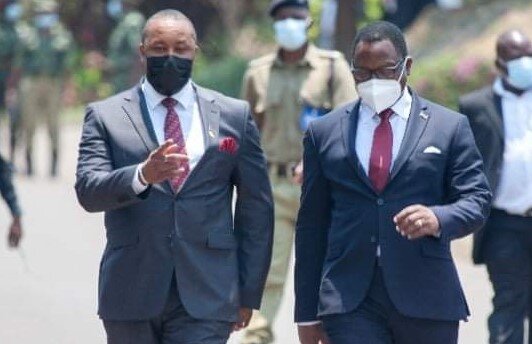
The State is expected to discontinue a corruption case against Vice-President Saulos Chilima in Malawi, according to sources familiar with the matter. While both Director of Public Prosecutions (DPP) Masautso Chamkakala and Anti-Corruption Bureau (ACB) director general Martha Chizuma refused to comment yesterday, sources say the DPP was scheduled to submit a certificate of discontinuance to the High Court Financial Crimes division last Friday.
“This was filed last Friday evening. I guess even the Judge (Redson Kapindu) is yet to see it. But what is important to note is that the case has been discontinued,” said a highly-placed source who is part of the prosecution team.
The source added: “The Legal Affairs Committee of Parliament within the course of the week will also be informed of this decision.”
My opinion:
Corruption erodes the trust we have in the public sector to act in our best interests, especially in Malawi. It wastes taxes and rates meant for important community projects, resulting in poor-quality services, infrastructure, or projects never getting off the ground. Corruption undermines effective governance by disregarding principles of accountability and the rule of law. Bribery and corruption are pervasive issues, with those entrusted with safeguarding state resources often being involved in embezzling public funds. Dealing with corruption decisively is essential because it can lead to death, injury, and financial loss to innocent parties, resulting in fewer or defective schools, hospitals, roads, and other public services. It is morally wrong.
Evidence:
If you are bringing a legal case in Malawi, a higher level of evidence is needed to persuade a court, an investigative, or an administrative authority that a corrupt act has occurred and was committed by the individual or body you say was responsible. Evidence refers to information or objects that may be admitted into court for judges and juries to consider when hearing a case. Evidence can come from varied sources, from genetic material or trace chemicals to dental history or fingerprints. The role of the Anti-Corruption Bureau (ACB) investigation team in Malawi is to investigate corruption issues and gather information to prove or disprove them. They should do this by interviewing witnesses, obtaining documents and records, analyzing information, and interviewing persons of interest. Bank records, accounting records, legal documents, or instruments are normally the basis for the case. They may well prove the circumstances around the alleged offense, but they may not necessarily provide all the essential elements of the criminal charge, such as the intention of the subject. Normally, before documentary evidence is admissible as evidence, it must be proved by other evidence from a witness that the document is genuine, called “laying a foundation.” As a general rule of evidence, a document shall be proved by primary evidence that is the document itself. Insufficient evidence is the evidence which fails to meet the burden of proof and is inadequate to prove a fact. In a trial, if the prosecution finishes presenting its case and the judge finds they have not met their burden of proof, the judge may dismiss the case (even before the defense presents their side) for insufficient evidence. For example, in criminal cases, the burden is to prove beyond a reasonable doubt, and failure to meet the burden results in insufficient evidence. Insufficient evidence may even be grounds for appeal.
What happens if there is not enough evidence to convict?
If there was not sufficient evidence to prove the crime charged beyond a reasonable doubt in Malawi, the defendant is found not guilty. It is not the job of the jury or the court to search for other crimes the defendant could be guilty of. It is the job of the prosecutor to make a correct charging decision. In a trial, if the prosecution finishes presenting their case and the judge finds they have not met their burden of proof, the judge may dismiss the case (even before the defense presents their side) for insufficient evidence. What is Insufficient Evidence? A finding (decision) by a trial judge or an appeals court that, as a matter of law, the case must be dismissed due to a lack of sufficient evidence presented by the plaintiff or prosecutor, which has not met the required standard of proof in such a proceeding. It is the prosecutor who needs evidence. The prosecutor will not charge the person without evidence. Sometimes that means that the police will arrest someone and then have to let that person go free if the prosecutor will not press charges at that point.
Conclusion:
I’m inclined to believe that the high-profile corruption case against Vice President Chilima in Malawi has been dropped because the government failed to meet the burden of proof and lacks adequate evidence to prove his guilt. Therefore, Vice President Chilima is entitled to appeal or sue the government for defamation of character or character assassination. It appears that the government, possibly realizing they lacked substantial evidence from the beginning, proceeded with the case for political reasons. This decision has now backfired, potentially at the expense of Malawian taxpayers. It’s disappointing that such mistakes continue to occur, especially considering the detrimental impact they have on the public’s trust and financial resources. This situation could have been avoided with better judgment from the outset.














